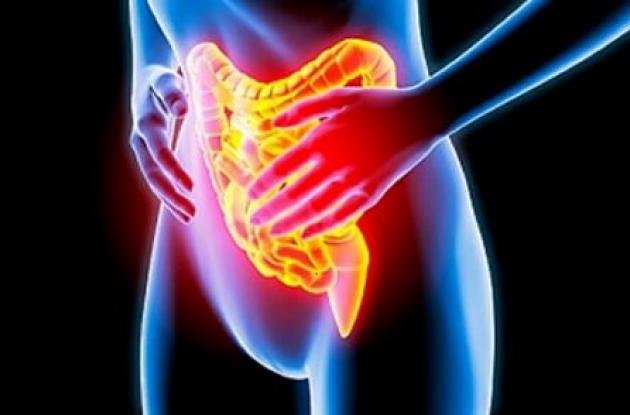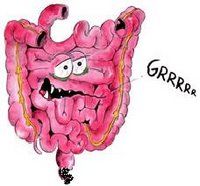Irritable bowel syndrome (IBS)

Causes
The reasons why IBS develops are not clear. It can occur after a bacterial infection or a parasitic infection (giardiasis) of the intestines. This is called postinfectious IBS. There may also be other triggers, including stress.
The intestine is connected to the brain using hormone and nerve signals that go back and forth between the bowel and the brain. These signals affect bowel function and symptoms. The nerves can become more active during stress. This can cause the intestines to be more sensitive and contract more.
IBS can occur at any age. Often, it begins in the teen years or early adulthood. It is twice as common in women as in men.
It is less likely to begin in older people above 50 years of age.
About 10% to 15% of people in the United States have symptoms of IBS. It is the most common intestinal problem that causes people to be referred to a bowel specialist (gastroenterologist).
Symptoms
IBS symptoms vary from person to person, and range from mild to severe. Most people have mild symptoms. You are said to have IBS when symptoms are present for at least 3 days a month for a period of 3 months or more.
The main symptoms include:
• Abdominal pain
• Gas
• Fullness
• Bloating
• Change in bowel habits. Can have either diarrhea (IBS-D), or constipation (IBS-C).
Pain and other symptoms will often be reduced or go away after a bowel movement. Symptoms may flare up when there is a change in the frequency of your bowel movements.
People with IBS may go back and forth between having constipation and diarrhea or have or mostly have one or the other.
• If you have IBS with diarrhea, you will have frequent, loose, watery stools. You may have an urgent need to have a bowel movement, which may be hard to control.
• If you have IBS with constipation, you will have a hard time passing stool, as well as fewer bowel movements. You may need to strain with a bowel movement and have cramps. Often, only a small amount or no stool at all will pass.
The symptoms may get worse for a few weeks or a month, and then decrease for a while. In other cases, symptoms are present most of the time.
You may also lose your appetite if you have IBS. However, blood in stools and unintentional weight loss are not a part of IBS.
Exams and Tests
There is no test to diagnose IBS. Most of the time, your health care provider can diagnose IBS based on your symptoms. Eating a lactose-free diet for 2 weeks may help the provider identify lactase deficiency (or lactose intolerance).
The following tests may be done to rule out other problems:
• Blood tests to see if you have celiac disease or a low blood count (anemia)
• Stool cultures to check for an infection
Your provider may recommend a colonoscopy. During this test, a flexible tube is inserted through the anus to examine the colon. You may need this test if:
• Symptoms began later in life (over age 50)
• You have symptoms such as weight loss or bloody stools
• You have abnormal blood tests (such as a low blood count)
Other disorders that can cause similar symptoms include:
• Celiac disease
• Colon cancer (cancer rarely causes typical IBS symptoms, unless symptoms such as weight loss, blood in the stools, or abnormal blood tests are also present)
• Crohn disease or ulcerative colitis
Treatment
The goal of treatment is to relieve symptoms.
In some cases of IBS, lifestyle changes can help. For example, regular exercise and improved sleep habits may reduce anxiety and help relieve bowel symptoms.
Dietary changes can be helpful. However, no specific diet can be recommended for IBS because the condition differs from one person to another.
The following changes may help:
• Avoiding foods and drinks that stimulate the intestines (such as caffeine, tea, or colas)
• Eating smaller meals
• Increasing fiber in the diet (this may improve constipation or diarrhea, but make bloating worse)
Talk with your provider before taking over-the-counter medicines.
No one medicine works for everyone. Some that your provider may suggest include:
• Anticholinergic medicines (dicyclomine, propantheline, belladonna, and hyoscyamine) taken about a half-hour before eating to control intestinal muscle spasms
• Bisacodyl to treat constipation
• Loperamide to treat diarrhea
• Low doses of tricyclic antidepressants to help relieve intestinal pain
• Lubiprostone for constipation symptoms
• Rifaximin, an antibiotic
Psychological therapy or medicines for anxiety or depression may help with the problem.

References
Aronson JK. Laxatives. In: Aronson JK, ed. Meyler's Side Effects of Drugs. 16th ed. Philadelphia, PA: Elsevier; 2016:488-494.
Canavan C, West J, Card T. The epidemiology of irritable bowel syndrome. Clin Epidemiol. 2014;6:71-80. PMID: 24523597 www.ncbi.nlm.nih.gov/pubmed/24523597.
Ferri FF, ed. Ferri's Clinical Advisor 2018. Philadelphia, PA: Elsevier; 2018:722-725.
Ford AC, Talley NJ. Irritable bowel syndrome. In: Feldman M, Friedman LS, Brandt LJ, eds. Sleisenger and Fordtran's Gastrointestinal and Liver Disease. 10th ed. Philadelphia, PA: Elsevier Saunders; 2016:chap 122.
Mayer EA. Functional gastrointestinal disorders: irritable bowel syndrome, dyspepsia, chest pain of presumed esophageal origin, and heartburn. In: Goldman L, Schafer AI, eds. Goldman-Cecil Medicine. 25th ed. Philadelphia, PA: Elsevier Saunders; 2016:chap 137.
Wilkins T, Pepitone C, Alex B, Schade RR. Diagnosis and management of IBS in adults. Am Fam Physician. 2012;86(5):419-426. PMID: 22963061 www.ncbi.nlm.nih.gov/pubmed/22963061.
Wolfe MM. Common clinical manifestations of gastrointestinal disease. In: Benjamin IJ, Griggs RC, Wing EJ, Fitz JG, eds. Andreoli and Carpenter's Cecil Essentials of Medicine. 9th ed. Philadelphia, PA: Elsevier Saunders; 2016:chap 33.
Probiotics and prebiotics is key
And necessary, greetings.